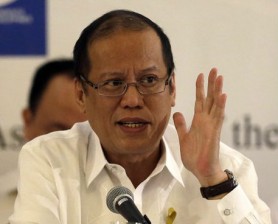MANILA, Philippines—President Aquino said Tuesday that the government did not sanction the attack by the Moro National Liberation Front guerrillas against Abu Sayyaf Group bandits that left at least 26 dead.
“There’s no sanction; there’s no clearance. They didn’t tell us that they’re gonna attack the Abu Sayyaf,’’ the President said after speaking at the Philippine Development Forum in Davao City.
The President’s deputy spokesperson, Abigail Valte, said they were deferring to local authorities to determine whether either camp would be held liable for the killings.
After years of fighting for secession, the MNLF signed a peace agreement with the Ramos administration in 1996.
The clash broke out Sunday morning, hours after the bandit group freed cameraman Ramelito Vela and audio technician Rolando Letrero Saturday night after eight months of captivity in the jungles of Sulu.
The fighting subsided Monday after the bandit group split into smaller groups, with a large group seen fleeing Patikul town to an adjacent town. Authorities put the death toll at 26.
On hearing about last Sunday’s clash, the President said he ordered the military and police to secure the civilians, and the Department of Social Welfare and Development to evacuate them.
“So there was something like 300-plus families that are currently being assisted primarily by the LGU (local government unit) of Sulu, assisted by our national government agencies,’’ Mr. Aquino told reporters in a chance interview with reporters aired over government-run radio.
He said the violence was “being contained’’ to prevent it from spreading beyond Patikul.
President Aquino took the opportunity to emphasize the importance of developing Mindanao, specifically the Autonomous Region in Muslim Mindanao to prevent similar skirmishes in the future.
“That’s what we’re hoping to achieve with the peace process: address the root cause of rebellion, and find solutions to the social ills that had not been addressed,’’ he said.
After the signing of a comprehensive peace agreement with the Moro Islamic Liberation Front, which broke away from the MNLF, the government would press ahead with its development plan for Mindanao, specifically ARMM, he said.
“We have a long list of plans especially for the ARMM,’’ he said.
The government and the MILF are now ironing out sensitive issues in the annexes of the framework agreement that was signed in October last year and that seeks to set up an autonomous Bangsamoro entity that would replace ARMM.
“With regards to the governance of the ARMM, there’s a transition commission leading up to the 2016 elections where there’s a transitional authority,” he said, referring to the body that would draft a proposed law creating a new autonomous government. “The people of Mindanao will be taking a more, shall we say, a more responsive approach to governance.’’
The entity that would replace the ARMM would address the problem on a long-term basis, he added.
